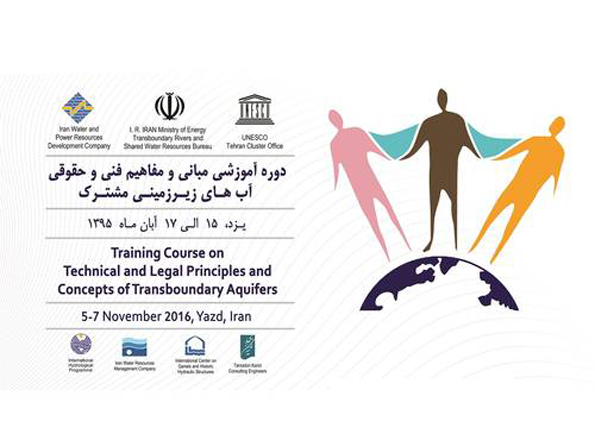UNESCO organizes three-day training workshop on Transboundary Aquifers

On 5 November 2016, water authorities from different provinces of Iran gathered together at Safayihe Hotel in Yazd to start a three-day training workshop on “Technical and Legal Principles and Concepts of Transboundary Aquifers” – the first of its kind, AVA Diplomatic reports.
The workshop is a joint initiative of the Ministry of Energy of Iran, the UNESCO Tehran Cluster Office, and the International Center on Qantas and Historic Hydraulic Structures (ICQHS). The training is aimed at addressing the challenges of managing transboundary aquifers, using international water conventions.
The opening ceremony was attended by Mr. Rahim Meydani, Deputy Ministry of Energy for Water Affairs, Dr. Mohammad Hassan Talebian, Deputy Head of the Iranian Cultural Heritage, Handicrafts and Tourism Organization (ICHHTO), Mr. Jabbar Vatanfada, Director-General of the Bureau of Transboundary Waters at the Ministry of Energy, Dr. Ali Asghar Semsar-Yazdi, Senior Advisor of ICQHS, and two international lecturers Dr. Raya Marian Stephan and Dr. Alistair Rieu-Clarke.
After welcoming remarks by ICQHS, Mr. Jabbar Vatan Fada of the Ministry of Energy, mentioned that the workshop had three main objectives: training Iranian experts and authorities on the international conventions on shared water bodies and shared aquifers; sharing the global experience in shared aquifers with Iranian experts and authorities; and applying global knowledge and experience to the local context, particularly in the selected Pilot Project.
Ms. Niloofar Sadeghi of the UNESCO Tehran Cluster Office welcomed the participants and resource persons. She then introduced the instructors of the training course, Dr. Raya Marina Stephan and Dr. Alistair Rieu-Clarke. She also emphasized the importance of the pilot aquifer between Yazd and Fars provinces, which would be discussed in detail during the three days of the workshop. Ms. Sadeghi said that the results of the pilot project as well as the final report of the training would also be useful for other UNESCO Member States.
Dr. Alexandros Makarigakis, UNESCO Program Specialist on Water for Human Settlements was the next speaker. Stating the urgency and gravity of the water situation around the world, Dr. Makarigakis indicated how water was a critical indicator of the Sustainable Development Goals. Currently about 2 billion people worldwide depend on groundwater, which includes approximately 300 transboundary aquifers. This situation requires cooperation between countries to save the ecosystem. He also briefly described UNESCO’s current projects in the field of transboundary aquifers and shared first-hand experiences from other parts of the world. He demonstrated how transboundary aquifers link populations of different countries and regions and have the potential to support the income and livelihoods of hundreds of millions of people worldwide.
The final speaker was Mr. Rahim Meydani, Deputy Ministry of Energy for Water Affairs. In congruence with Dr Makarigakis remarks, he stated that we were faced with scarcity of water resources and bound to learn to efficiently manage our limited resources.
For three days the participants will work closely with international lecturers to learn about the technicalities of international conventions. The workshop will continue until 7 November 2016 and will conclude with a field visit to Hasan Abad-e Moshir and Bagh Pahlevanpoor Qanat in city of Mehriz.

